Please visit our Faculty and Student calendars to find appropriate events across the sciences. If you have an event to share with the CIS, please contact Anika (adane@wesleyan.edu).
This Week's Seminars:
|
April 28, Shanklin 107 |
Biology and MB&B Seminar Series Dr. Joel Wetheim, UC San Diego |
|
April 30, Van Vleck Observatory 110 |
Astronomy Colloquium Alice Booth "The Chemistry of Planet Formation" |
|
May 2, Woodhead Lounge |
NSM Luncheon Series Cori Anderson and Anthony Davis, CIS "CIS101 – Helping First-Year Students Succeed in STEM." Pizza and drinks will be available starting at 11:50. |
|
May 2, Exley 121 |
CIS Masters candidate Luis Perez "A Systems Analysis of the Ribosome CAR Neighborhood" |
This Week's Workshops:
IDEAS LAB
Please take a moment to give me some feedback about the IDEAS Lab, what we did right, what could be improved on, etc. Your responses will be read, and will directly influence my policies for next semester, so it's not a waste of time!
Thank you, and good luck with the next couple of weeks!
https://forms.gle/6g5teiEcwexFB2eKA
This Week's Events:
|
April 30, Exley 137 |
Wednesdays with WesWIS Join us for open discussions on topics like: wellness during midterns, imposter syndrome, finding community in STEM, and anything else on your mind! Snacks provided |
|
April 30, Van Vleck Observatory |
Space Night Join us to learn about what's up in the night sky. Each Space Night Starts with a half-hour interactive presentation by a member of our department (atronomy majorsm graduate students, or faculty) on a topic of space news or recent discoveries in astronomy, followed by observing through the telescopes when it's clear. Aimed at high school level and above, but all visitors are welcome. Space Night is rain or shine, but the weather may impact if the telescopes are open. |
Upcoming Events:
- Next Tuesday, May 6, students from WesWIS an WesWAVES are sharing a presentation on the experiences of underrepresented students in STEM. Join us noon-1pm in Exley 058, pizza and drinks will be provided.

- The NSM Academic Open House is scheduled for Saturday, May 24, 2-4pm as part of Reunion/Commencement Weekend.

- Lecture Series
The CIS Lecture Series (CIS221) is held Fridays, 1:20pm-2:40pm, Shanklin 201.
- Additional Seminars of Interest
NSM Departmental Seminar Series
- Workshops
IDEAS Lab Workshops offered most Wednesdays and Thursdays at 5pm (figure 1-2 hours, depending on the workshop) and Friday mornings at 11am. You can see a rough plan (work-in-progress) at this link.
These workshops are open to anyone on campus, and require access to the IDEAS Moodle page. Please contact Ben Parker (bdparker@wesleyan.edu) to be added to the page.
In order to use any of the equipment, you must have taken one of the 20-minute New User Orientation sessions in the lab, which are scheduled just before most of the workshops. You can go to this link to view the orientation timeslots. Those badged for the IDEAS Lab have access to the space (and any equipment they are badged for) Fridays from 10am to 6:45pm and Saturdays from 1pm-3:45pm.
If you have any trouble accessing the moodle, please let me know, and I can add you. I hope to see you in one of the workshops!-----------------------------------------------Ben Parker860-268-6911 (c)IDEAS Makerspace Coordinator - Other Events
Please visit our Faculty and Student calendars to find appropriate events across the sciences. If you have an event to share with the CIS, please contact Anika (adane@wesleyan.edu).
- Recent Events
A wonderful event to bring New England SACNISTAS (and not SACNISTAS) together! Consider attending and bringing a poster or even try to give a talk! (Facebook Link)
2025 SACNAS New England Community Gathering, Saturday, April 12, 2025, New Haven, CT
Register by March 5: https://bit.ly/SACNASGatheringNE25

Presented by the Physics Department and the College of Integrative Sciences as part of Earth Month.
Science in Uncertain Times
Thursday, April 10·11:50am – 1:10pm; Exley 058Students can join WesWAVES for a chat with Gabriel in Allbritton 311, 1:30pm.RSVP: adane@wesleyan.edu
Join us this Thursday, Feb. 27, at the Gordon Career Center from 11:30 a.m.-1:30 p.m. for a STEM Career Workshop!The GCC STEM Career Advisor will be presenting on what makes STEM resumes stand out at 12:00 p.m., and Peer Career Advisors will be available to meet with you one-on-one for resume reviews, tips, and answers to any pertaining questions!Make sure to stop by before, during, or after the presentation to get a FREE headshot taken for your LinkedIn or Handshake profile by a professional photographer! Headshots will be first-come, first-served. For more information, check out Handshake!
Research-a-palooza! A resource fair for all research opportunities at Wesleyan, including CIS, COE, and GISOS. Here’s the link to the Handshake event
Friday, February 28, 1:30pm-3:30pm, Gordon Career Center

Are you passionate about optics, photonics, and light-based technologies, or just curious about the science behind how we see and interact with the world? We’re excited to announce the formation of a new Optica Student Chapter at Wesleyan University, and we want you to be part of it!
What’s Optica?
Optica (formerly OSA) is a global professional society dedicated to advancing optics and photonics. Founded in 1916, Optica has grown from a small group of scientists into an international community spanning 93% of the world’s countries, and it rebranded in 2021 to reflect its cutting-edge focus on light-based innovation. Student chapters provide opportunities for networking, research collaboration, career development, and outreach.
First Meeting Details
📅 Date/Time: Friday, February 21st @ 4:00 PM
📍 Location: Exley Science Center, Room 201 (Stearns Classroom)Why Attend?
- Help shape the future of this chapter!
- Learn how Optica can support your academic and career goals.
- Appoint tentative officers – leadership roles are open!
No prior optics experience is needed – all majors and levels of curiosity are welcome!
Can’t make it but interested? Join our GroupMe group: https://groupme.com/join_group/106105984/EbOuQCCq
2/22 Community Campus Day: Heritage – for 6th-12th graders!Community Campus Day (CCD) invites local 6th-12th graders to Wesleyan’s campus to engage in free, hands-on workshops led by Wesleyan staff and community partners. The theme of this CCD is heritage and will feature West African Dance, Gamelan (Indonesian Music/Percussion), Creative Writing, Leather-Tooling, and Earth’s Minerals (Earth and Environmental Science) workshops. Each student will have the opportunity to attend two workshops. No previous experience is required. Breakfast and snacks will be provided.Saturday, February 22nd, 9:00am-12:30pm, Usdan at Wesleyan University
WesWIS presents: Brown-bag lunch with new junior faculty women in the sciences (bring your own lunch). Snacks will be provided!
Where: Exley 137
When: Tuesday, February 18, 12pm-1pm
Who: All of you, plus awesome faculty women from across NSM.We've arranged another opportunity for you to come and talk to women faculty members about whatever you like — their research, their career trajectory, the advice they have for aspiring young scientists, and how to join their labs. We hope you can join us!
International Students in STEAM Information Station (part of Power of Language Week)
Monday, February 17, 2025 . 12:30pm-2:30pm . Exley LobbyCalling all international students and faculty in science, technology, engineering, art, and math! Come to our information station to share your advice for students in STEAM in your own language. We will also be on hand to take suggestions for an affinity group we hope to launch later this semester. We want to hear from YOU! You can also complete this survey online.


The College of Integrative Sciences Annual Retreat will be held at Russell House on Thursday, January 16, 2025.
- 9:30 Coffee
- 10:00 Welcome and Introductions
- 10:15 Inclusion in STEM
- 10:30 Curriculum Updates and Presentations
- 11:15 Break-out Sessions for Curriculum
- Noon Lunch
- 1:00 CIS News
- 1:15 Engagement and Activities Updates and Presentations
- 2:00 Break-out Sessions for Engagement and Activities
- 2:45 Wrap-up Discussion
- 3:30 Reception
🏡 MB&B Majors OPEN HOUSETuesday, November 5
12:00 to 1:00 pmWoodhead Lounge
Molecular Biology and Biochemistry OPEN HOUSE to introduce prospective majors to the faculty and major requirements. 🎃 PUMPKIN FEST!Saturday, October 26noon to 4 pmLong Lane FarmJoin us for FREE veggie burgers and hot cider, live music, vendor crafts for sale, activities for the kids, and much more! This event is FREE and open to the public.
🎃 PUMPKIN FEST!Saturday, October 26noon to 4 pmLong Lane FarmJoin us for FREE veggie burgers and hot cider, live music, vendor crafts for sale, activities for the kids, and much more! This event is FREE and open to the public.
The CoDES Open House is this Friday!
DATE/TIME: Friday, 10/25/24, 12-1PM
LOCATIONS: Exley lobby and IDEAS Lab (Exley Ground Level)

Lights Out! At the Observatory
Dark Skies - Keep it Spooky!
This Halloween season, come soak in the splendor of a dark night sky and learn about urgent threats to the space environment. Activities for all ages include a guided nighttime walk, stargazing through modern and historic telescopes, student talks, science and arts activities, and a planetarium star show. Costumes encouraged! Follow our Instagram for the forthcoming schedule, @wes_astro.
Stargazing and Hot Chocolate
Thursday, October 3, 2024, 9:00-10:00pm, Van Vleck Observatory
Join us at Van Vleck Observatory to use the telescopes, enjoy hot chocolate, and chat with other women in science! The event is open to all majors and genders, so bring your friends! We will be there rain or shine! If the weather doesn't cooperate, we will be setting up the planetarium inside. We hope to see you there! œ
Applying to STEM Summer Undergraduate Research Programs
Are you interested in a paid summer research experience in the field of Biological Sciences, Physical Science, Computer Science, Social and Behavioral Science, Engineering, Mathematics, or related disciplines?
Come to the Applying to STEM Summer Undergraduate Research Programs workshop to learn more about applying to Research Experiences for Undergraduates (REU), Summer Undergraduate Research Programs (SURP) and other summer research opportunities.
The workshop will be held Tuesday, October 1st @ 12:00pm in Exley 184 (Woodhead Lounge).
We will discuss the resources to begin your program search, the application process and timeline, and specific eligibility requirements. Don't miss out on the unique opportunity to gain hands-on experience in a field that excites you!
Hear from two Wesleyan students who have successfully applied for and completed a summer research experience (REU) for application tips.
We hope to see you there!
The Gordon Career Center | Wesleyan University
Boger Hall · careercenter@wesleyan.edu · 860-685-2180
Schedule an Appointment · careercenter.wesleyan.edu
Women in Science Kickoff Meeting!
Friday, September 20, 2024, 12:00pm, Exley Science Center 121 — lunch provided!
Come eat some pizza, meet the Steering Committee, find out about WesWIS activities and events, give your input about how WesWIS can help you this year, and meet other awesome science majors. We hope you'll be able to join us! People of all genders and majors are welcome at WesWIS events.


Welcome Social and Informational Meeting, Friday, September 6, 1:20pm-2:40pm, Shanklin 201
Are you interested in an interdisciplinary science education that touches the frontiers of modern research? Please join us! Sophomores are strongly encouraged, but we welcome ALL.

NSM Academic Open House during Reunion/Commencement
Saturday, May 25, 2024 2:00-4:00pm on the Exley Patio
CIS Spring Soirée for faculty and staff, May 8, 2024, 3:30pm, Allbritton 311
Join CIS affiliated faculty to learn about current research projects and seek connections and collaborations for ongoing projects!


CIS Celebration of Science, Friday, April 19, 2:00-3:30pm
Join the College of Integrative Sciences in the Exley Science Center lobby for a poster session and reception featuring thesis students and prize winners from the Research in Science summer program. CIS facilitates undergraduate student research for all NSM departments and related programs across campus. Remarks at 3:00pm.
CIS Open House for new and prospective majors
Thursday, February 22, 2024, 12:00pm Woodhead Lounge

Majoring in science or math? Interested in research? Learn how the CIS linked-major can accelerate your goals. Lunch provided!
Research-a-Palooza 2024!
Saturday, February 3, 2024
- 12:30-1:30pm Panel and Q&A (zoom)
- 2:00-4:00pm Presentations and Networking (Gordon Career Center + zoom)
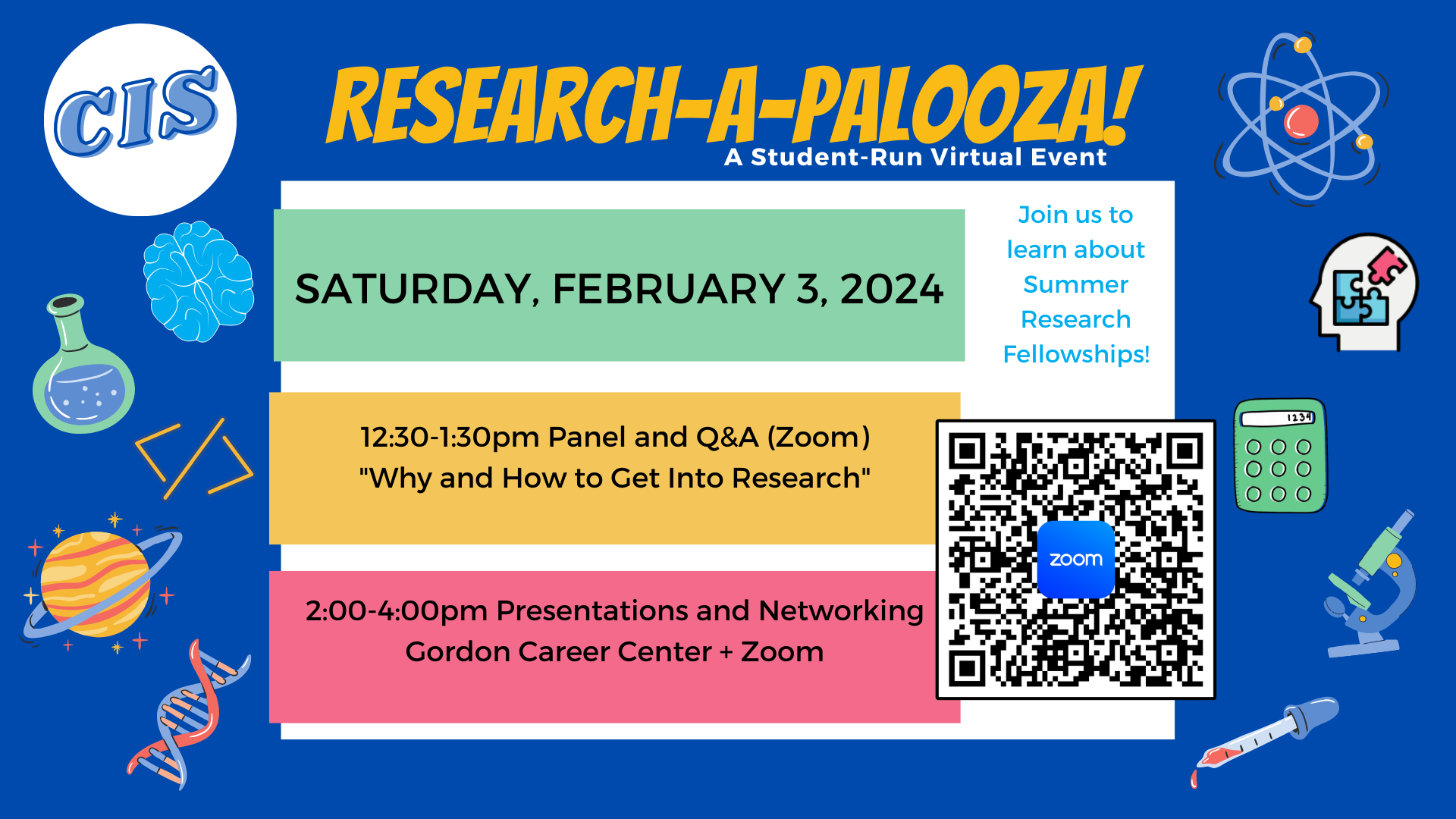
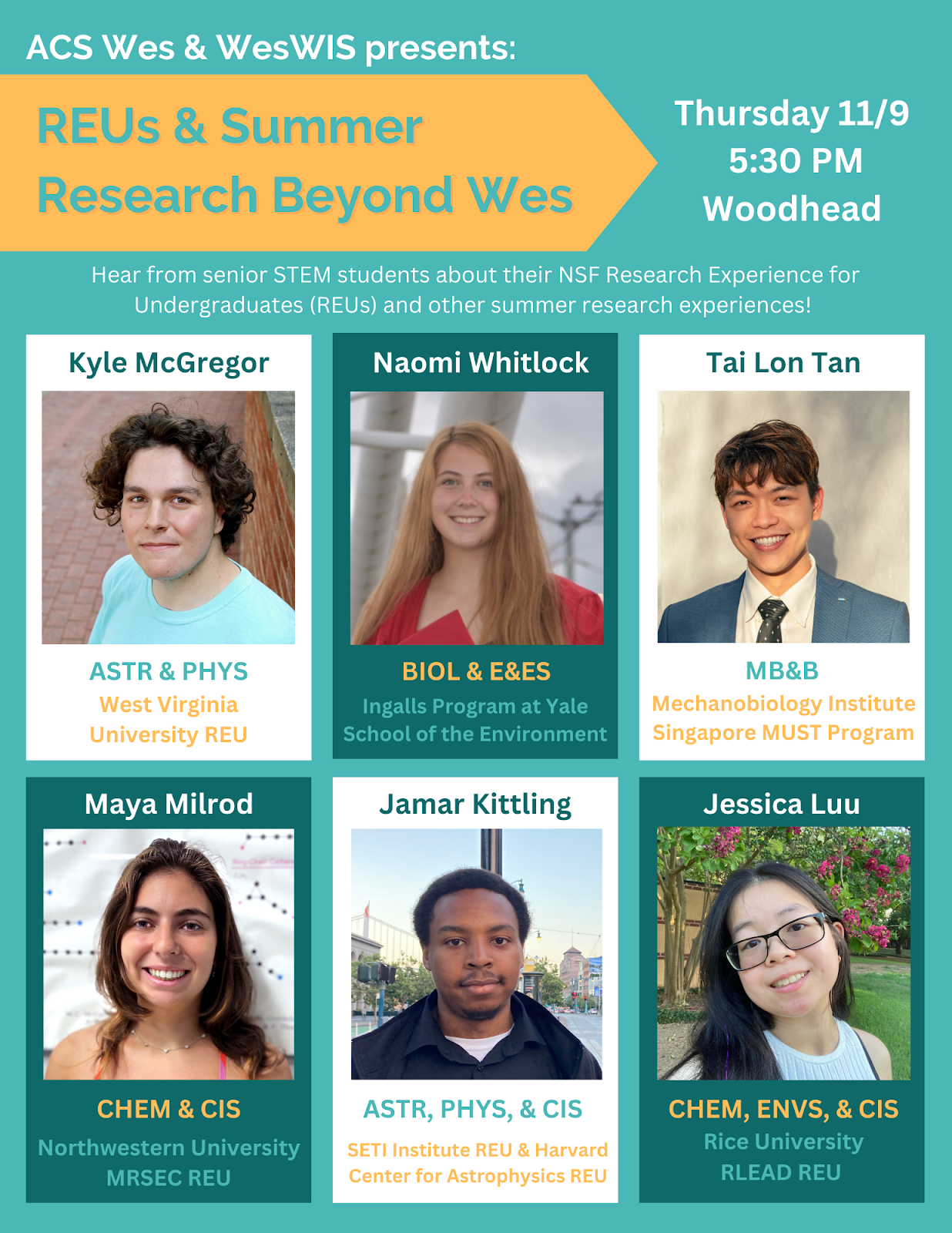

Summer Research at Wesleyan Poster Fair
Want to learn about summer research at Wesleyan? Join us in the Woodhead Lounge in Exley on October 26th from 5:30-6:45 pm for the Summer Research at Wesleyan Poster Fair! Come meet students who did summer research across the STEM departments, chat with students about labs, and view research posters. Food provided.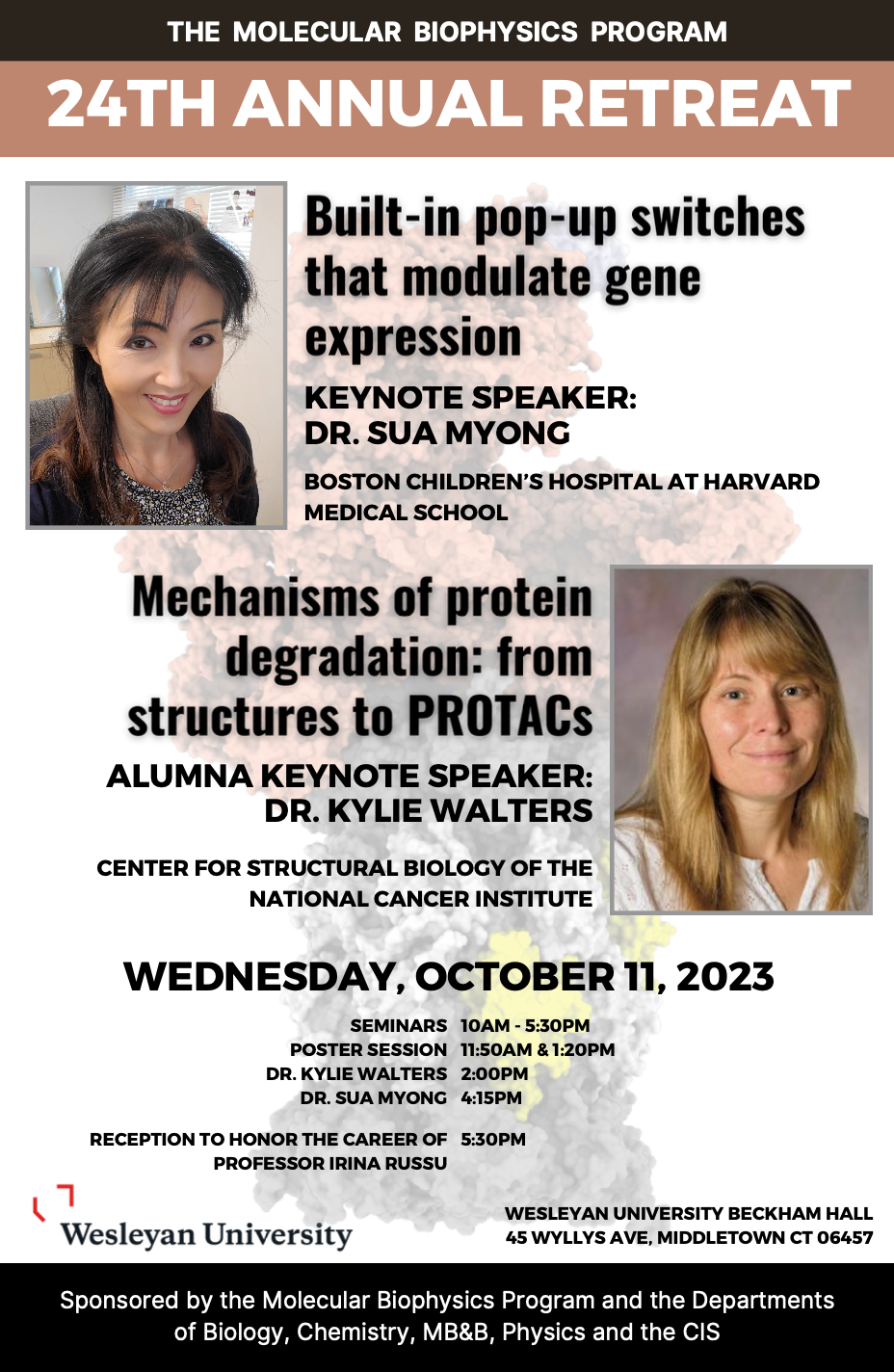
Meet-&-Greet with the Biophysics Keynote Speakers
The Molecular Biophysics Program will be holding its 24th Annual Retreat on October 11th! The next morning, October 12th from 9:45 - 10:45 am, keynote speakers Dr. Sua Myong and Dr. Kylie Walters will be available for a meet-&-greet! Stay tuned for location. Star GAY-zingThursday, October 12, 2023, 7:00-9:00pm, Van Vleck Observatory
Star GAY-zingThursday, October 12, 2023, 7:00-9:00pm, Van Vleck Observatory
Star GAY-zing is on Thursday, October 12th from 7-9 pm at VVO Observatory! Join us for stargazing and telescopes, cookies, mini talks, and discussion about LGBTQIA+ spaces in science. All genders, identities, ages, and majors are welcome. Event sponsored by WesWIS, the Wesleyan Astronomy Department, City of Middletown Pride, the Resource Center, and the Office of Equity and Inclusion.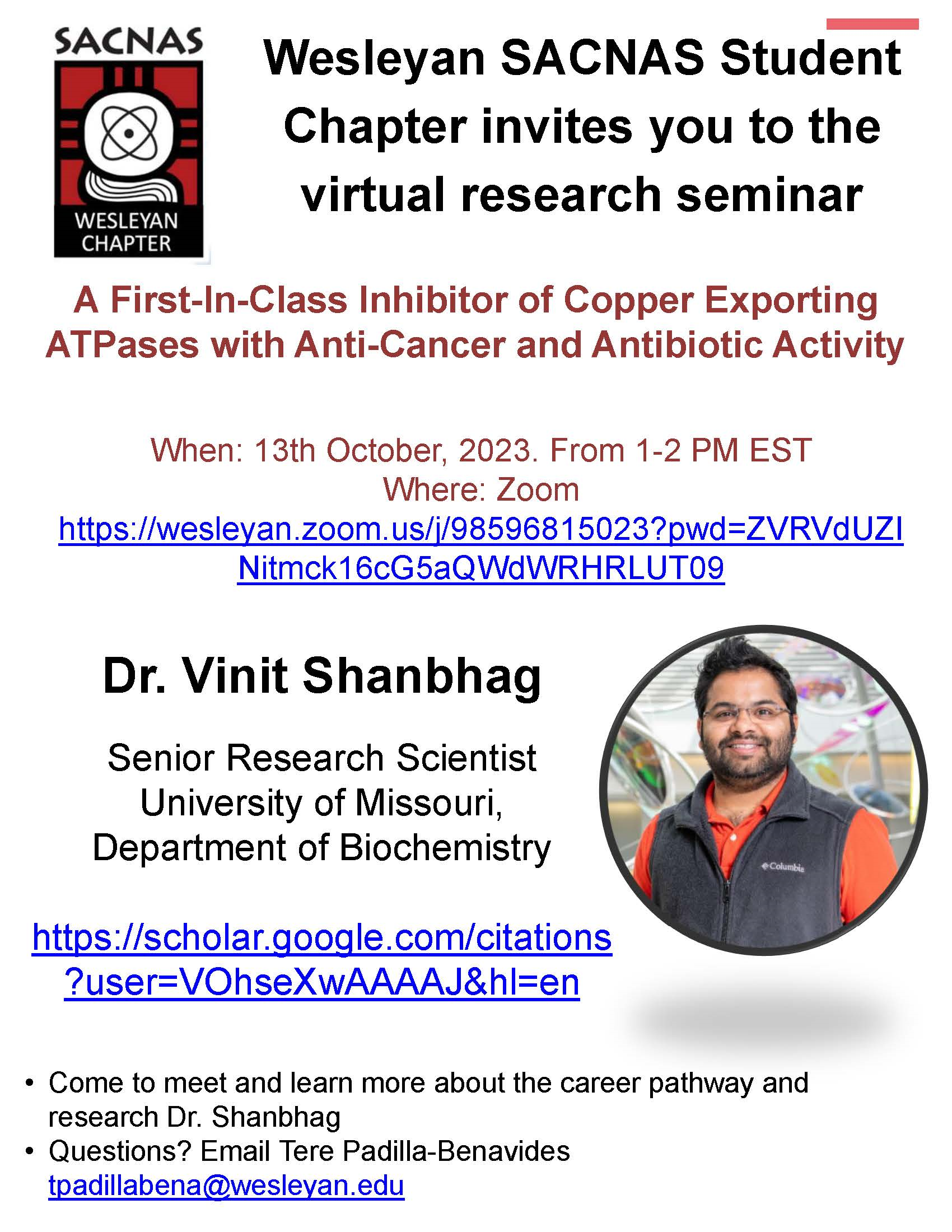 SACNAS Virtual Research SeminarFriday, October 13, 2023, 1:00-2:00pm, Zoom
SACNAS Virtual Research SeminarFriday, October 13, 2023, 1:00-2:00pm, Zoom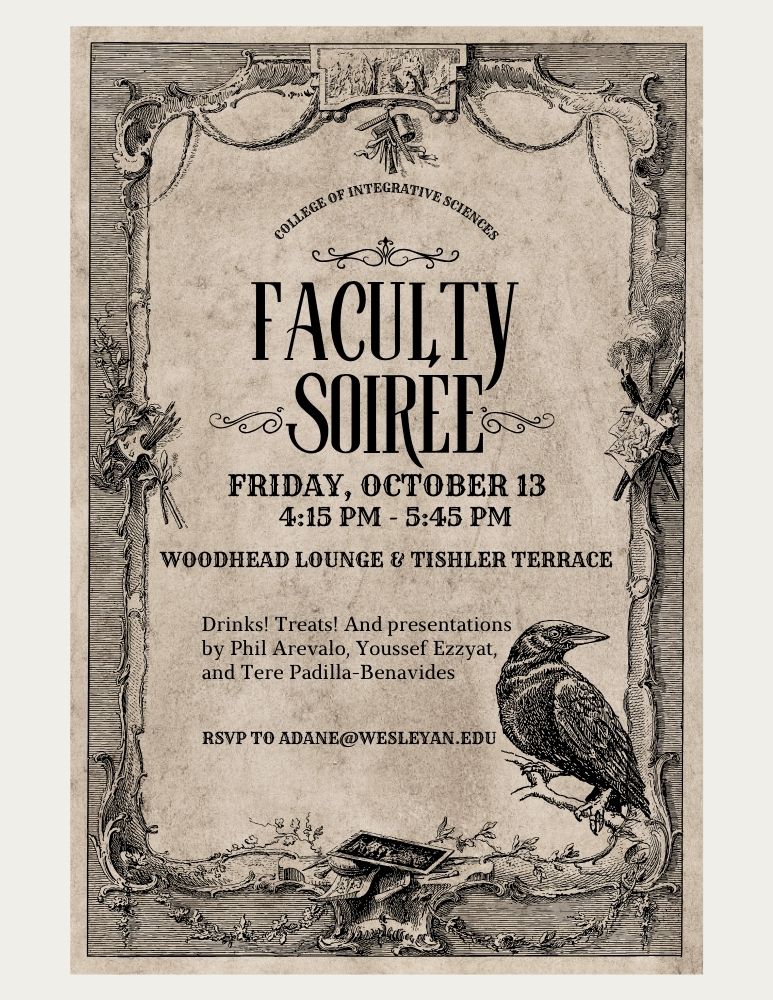 CIS Faculty SoiréeFriday, October 13, 2023, 4:15-5:45pm, Woodhead Lounge and Tishler Terrace
CIS Faculty SoiréeFriday, October 13, 2023, 4:15-5:45pm, Woodhead Lounge and Tishler Terrace
Our Fall Soirée will be held on Friday the 13th and feature presentation by Phil Arevalo (Biology), Youssef Ezzyat (Psychology), and Tere Padilla-Benvides (MB&B) on the theme of "luck". Drinks and treats provided!ELEMENTAL Book Launch and Signing – Beneski Museum: Stephen Porder will be in conversation with Nancy Pick about his new book Elemental: How Five Elements Changed the Earth’s Past and Will Shape Our Future (2023, Princeton University Press) on Thursday, September 28 at 4:00 pm in the Beneski Museum of Natural History at Amherst College. Elemental explores how microbes, plants, and people used the fundamental building blocks of life to change our living planet, and how understanding our collective past can help us build a more sustainable future. Porder is the Acacia Professor in the Department of Ecology, Evolution, and Organismal Biology, and in the Institute for Environment and Society, as well as the Associate Provost for Sustainability at Brown University. His research is focused on the interdisciplinary investigation of terrestrial ecosystems, combining ecology, biogeochemistry, and geology. As Associate Provost he leads the charge to eliminate fossil-fuel combustion from campus and to integrate this and other sustainability goals into the research, teaching, and lived experience at Brown. Dr. Porder received his BA in History from Amherst College in 1994, his MS in Geology from The University of Montana in 1997, and his Ph.D. in Biology from Stanford University in 2005. Nancy Pick is a 1983 graduate of Amherst College. Among other contributions, she is the author of Curious Footprints: Professor Hitchcock’s Dinosaur Tracks & Other Natural History Treasures at Amherst College (2006, Amherst College Press) and Eye Mind Heart: A View of Amherst College at 200 (2020, Amherst College Press).The public is welcome.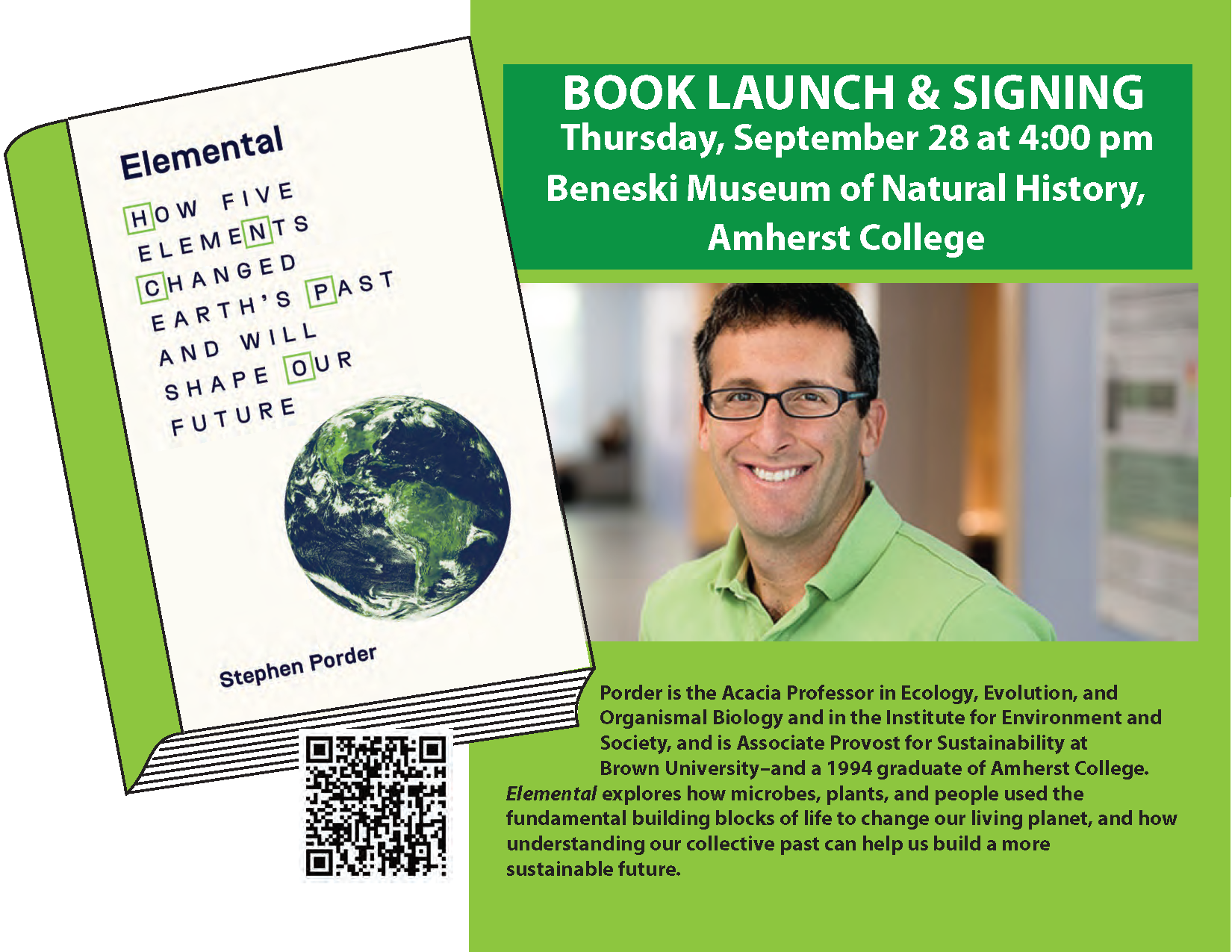
Presented by Wesleyan’s SACNAS chapter, a panel on the Graduate School Application process, Summer Research on and off campus, and the McNair program. September 28, 12:30pm-2:30pm, in Hall-Atwater 84 with student, faculty, and staff speakers. Pizza and refreshments will be provided!
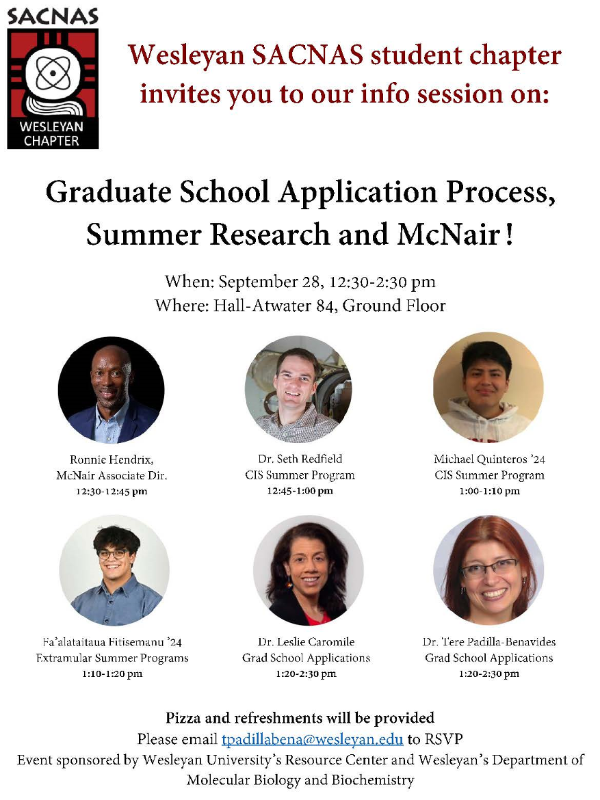
 Stargazing and Hot ChocolateWednesday, September 27, 2023, 9:00pm, Van Vleck ObservatoryJoin us at Van Vleck Observatory to use the telescopes, enjoy hot chocolate, and chat with other women in science! The event is open to all majors and genders, so bring your friends! We will be there rain or shine! If the weather doesn't cooperate, we will be setting up the planetarium inside. We hope to see you there!
Stargazing and Hot ChocolateWednesday, September 27, 2023, 9:00pm, Van Vleck ObservatoryJoin us at Van Vleck Observatory to use the telescopes, enjoy hot chocolate, and chat with other women in science! The event is open to all majors and genders, so bring your friends! We will be there rain or shine! If the weather doesn't cooperate, we will be setting up the planetarium inside. We hope to see you there!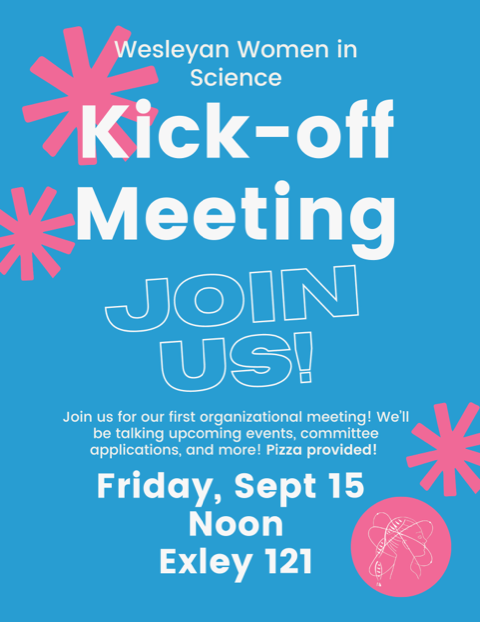 Women in Science Kick-Off MeetingFriday, September 15, 2023, 12:00pm, Exley 121Come learn about Wesleyan Women in Science: our mission, events, activities, mentoring opportunities and more! Pizza lunch will be provided.
Women in Science Kick-Off MeetingFriday, September 15, 2023, 12:00pm, Exley 121Come learn about Wesleyan Women in Science: our mission, events, activities, mentoring opportunities and more! Pizza lunch will be provided.
